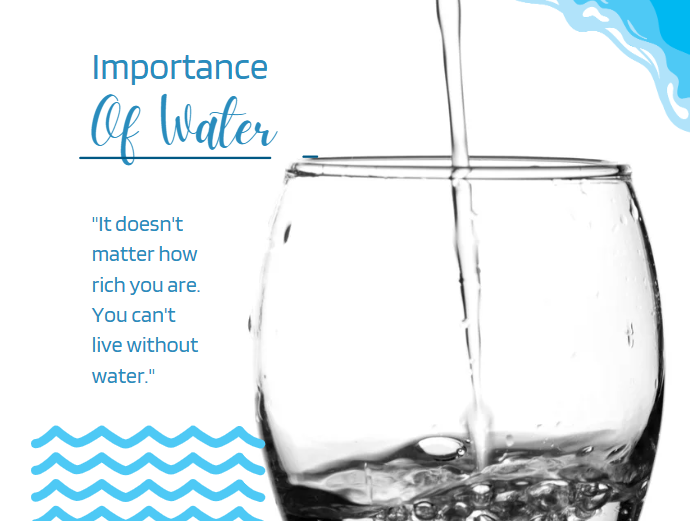
Importance Of Water: How Water Is Benefit In Our Daily Routine
1. Water is the Foundation of Life
Every living organism on Earth depends on water for survival. For humans, it is essential for sustaining life. Our bodies are made up of about 60% water, and this fluid is crucial in maintaining various bodily functions such as:
- Regulating Body Temperature: Water helps regulate temperature by sweating and breathing. It acts as a coolant and keeps our body temperature within a safe range.
- Transporting Nutrients: Water is a key component of blood, which transports oxygen and nutrients throughout the body, ensuring that all cells function optimally.
- Digesting Food: Water aids in breaking down food so that your body can absorb nutrients. It also helps prevent constipation by keeping things moving through the digestive system.
- Detoxifying: Water plays a critical role in flushing out waste and toxins through urination, sweating, and even breathing.
2. Water Supports Health and Well-being
Adequate hydration is essential to overall health. Here are some specific ways water supports physical and mental well-being:
- Prevents Dehydration: Dehydration can lead to a range of health issues, from headaches and dizziness to more severe complications like kidney stones and urinary tract infections (UTIs). Drinking enough water helps prevent these problems.
- Boosts Energy: Proper hydration can improve your mood, boost energy levels, and enhance cognitive performance. Dehydration, on the other hand, can lead to fatigue, irritability, and lack of focus.
- Promotes Skin Health: Water keeps your skin hydrated, helping to maintain elasticity and prevent dryness, wrinkles, and other skin issues.
- Supports Joint Health: Water lubricates joints and helps prevent the friction that leads to pain and inflammation, making it important for physical mobility.
3. Water is Vital for Agriculture and Food Production
Water is critical for agriculture, which provides food for billions of people worldwide. It is used to irrigate crops, water livestock, and process food products. Without water, we wouldn’t be able to grow the food we rely on every day. In fact:
- Irrigation: Agriculture accounts for around 70% of global freshwater use, with irrigation systems allowing crops to grow in regions with insufficient rainfall.
- Livestock: Animals need access to fresh water for drinking and for processes like cooling and cleaning.
- Food Processing: Water is used in many stages of food processing, from washing vegetables to cooking and preserving food.
As the global population continues to grow, the demand for food and water will increase, making water conservation and sustainable agricultural practices even more important.
4. Water Supports Ecosystems and Biodiversity
Water is crucial for the survival of ecosystems. Rivers, lakes, oceans, and wetlands provide habitat for countless species of animals, plants, and microorganisms. Aquatic ecosystems, such as coral reefs, wetlands, and freshwater lakes, are biodiversity hotspots and contribute to the health of the planet.
- Marine Life: Oceans are home to a diverse range of species, from tiny plankton to massive whales. Water is essential to the survival of these creatures, as it provides food, oxygen, and habitat.
- Freshwater Habitats: Rivers, streams, and lakes support species that depend on freshwater environments. Many species of fish, amphibians, and birds rely on clean water to live and thrive.
- Pollination and Ecosystem Balance: Water plays a role in ecosystems that support pollination, nutrient cycling, and plant growth, all of which are essential for a healthy planet.
Unfortunately, pollution, climate change, and deforestation are putting significant pressure on these vital ecosystems. Protecting water resources is not only important for human life but also for preserving the biodiversity of our planet.
